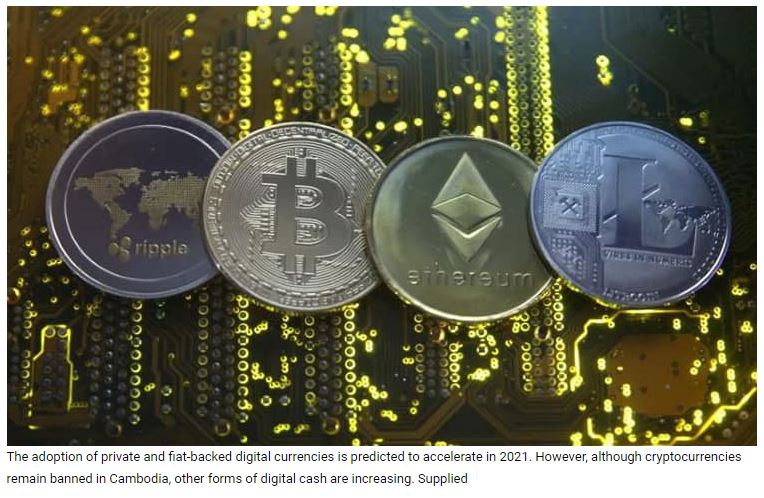Cambodia – DMI: Digital currencies revolution will happen this year
As the world recognises there will be no return to a pre-pandemic “business as usual” while COVID-19 still lingers, the increased urgency to adopt a reliable and convenient digital payment service in the new normal is clear.
Therefore, according to the global central banking think tank OMFIF Digital Money Institute (DMI), the money revolution will take place in 2021 driven by tech disruptors as the most important agents of the state.
In a report released this month, dubbed “The Race for The Future”, the DMI said: “[2021] will see significant changes in the global payment market and will witness both material upgrades to existing systems and the emergence of digital economies.”
It continued, “We will see the rapid development of both central bank digital currencies and fiat-backed private money around the globe. Cryptocurrencies will have only marginal presence as payment instruments but disproportionate publicity as speculative assets.” According to DMI, the 2020 pandemic has turbocharged a dizzying acceleration of the development of a complex global digital economy and of the sophisticated digital payment systems upon which it will rely. “To many, this offers the exciting prospect of cheaper, more efficient and more secure transactions on a global scale – and the possibility of extending financial inclusion to millions of citizens.”
The report said that in developing economies such as Cambodia, responses to COVID-19 have led to greater financial and digital inclusion, although cryptocurrencies remain illegal.
Asad Yaqub, International Finance Corp (IFC) representative in Cambodia, said his organisation recognises a huge opportunity in the growth of mobile banking in the Kingdom. “I can see new technology leapfrogging traditional banking systems as it helps people overcome barriers to accessing financial services. There is no doubt that safety restrictions during COVID-19 and general apprehension over safety concerns in the handling of cash notes has greatly contributed to a high acceptance rate of mobile growth in Cambodia. We know from our global experience at IFC that mobile payments can significantly spur financial inclusion,” he added.
In OMFIF’s Future of Payments report, published at the end of 2020, one Asian central bank reported that 1.6m individuals gained access to their country’s formal banking system during the first half of 2020, while mobile banking transactions rose 192 percent during the same period.
Payment revenues worldwide have doubled over the decade, reachng $2 trillion in 2019, according to McKinsey’s Global Payments Report. “There is a difference between the way Cambodia has adopted digital transactions and the way the developed world did. Here, it is necessity that drove growth initially rather than convenience. That’s why the Agent Banking Model still drives Cambodia’s digital transactions rather than self-done transactions,” Wing Chief Executive Officer Manu Rajan said.“Over the next three to four years, we will see a tipping point that will lead to a mass adoption of e-wallets and mobile financial services… to help financial inclusivity.” DMI added even though payment revenues are estimated to have fallen 22 percent in Q1/2020, the decline has been accompanied by growth in online payments.
Source: https://www.khmertimeskh.com/50814322/dmi-digital-currencies-revolution-will-happen-this-year/


 English
English




